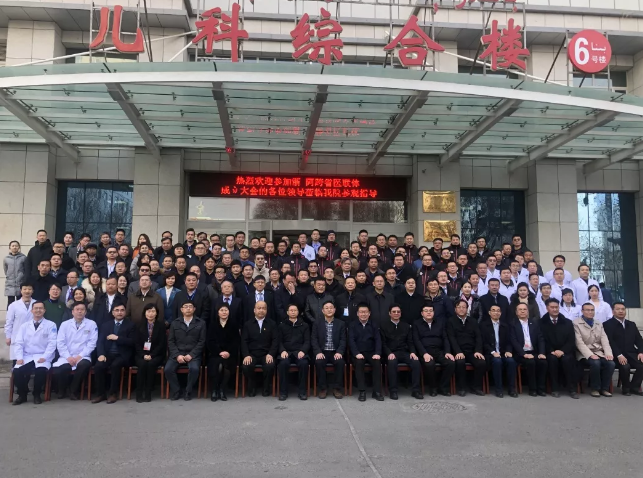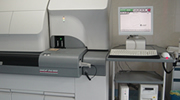Joining the Zhejiang-Xingjiang Medical Association, our Hospital Assisted Aksu region's First People's Hospital to Build the Southern Xinjiang Medical Highland!
Hits: 3424 Time: 2019-01-11
Real action to help Xinjiang was done with new ideas. On 4th, January, the ninth batch of Zhejiang medical personnel in "group-style" was ready to create a new article. On that day, "Three large volume and two remote" which are "large volume medical", "large volume group", "large volume assistance" , "remote medical care" and "distance learning".) as well as cross-provincial medical consortium establishment conference were held in Xinjiang Aksu Guest Hotel. The participants also went to Aksu First People's Hospital and the First Division Hospital of its Corps to visit the inspection group-style medical assistance work. The following leaders took part in this conference. Bao Baogeng, as the deputy director of the Zhejiang Health Commission and inspector, Zhou meilin, as members of the Party Group of the Autonomous Region Health Committee and deputy director and other leaders, including the representatives of the 13 Zhejiang supporting hospital which contains Song Baibin as vice president , 200 representatives which were from Xinjiang Production and Construction Corps and eight counties and one city, Zhejiang Provincial Aid Commanding Department party secretary, commander, Wang Tonglin as the deputy secretary of the local party committee, local party committee member Maimaiti · Shawuti, Kang Ju as deputy commissioner of the executive branch and other leaders, all of them attended the meeting.

Learning the cooperation model of the Yangtze River Delta Hospital Alliance to promote the "Three large volume and two remote" project of Zhejiang Medical Aid to Xinjiang involving the "large volume medical", "large volume group", "large volume assistance" , "remote medical care" and "distance learning”. Raised by both Zhejiang Provincial Health Commission and the Aiding Xinjiang Command Department, the establishment was composed of an inter provincial medical consortium composed by four hospitals directly under the Zhejiang Health Commission, including our hospital, three affiliated hospitals of Wenzhou Medical University and the Aksu First People's Hospital and inter provincial support and flexible assistance composed by six affiliated hospitals of Zhejiang University and the first division hospital of the corps. With clear responsibilities, time limits and assigning tasks, they carried out flexible assistance for inter provincial support and improved the "weakness" of non-recipient professional assistance to form the joint supporting network of multi-provinces, one district and counties to help Aksu to build a medical highland in southern Xinjiang.

As the dispatched unit of "group-model" assistance to Xinjiang by medical talents in Zhejiang Province, our hospital had always attached great importance to this task. Since the Organization Department of the CPC Central Committee, the National Health Commission and other ministries and commissions started the "group" assistance of medical talents to Xinjiang in April 2016, our hospital had established a long-term assistance relationship with the first people's Hospital of Aksu region. Over the past two years, eight experts had been selected to participate in aiding Xinjiang. They were involved with the discipline of cardiovascular medicine, critical medicine, gastroenterology, endocrinology, etc. In October 2018, our hospital also signed a one-and-a-half-year agreement with the first people's Hospital of Aksu region on " the Hospitals’ precise support to the Xinjiang departments." In the aspects of discipline management, talent training, technology training, medical management, etc., ICU will be a great motor to comprehensively assist the construction and development of the intensive care medical center of the Aksu first people's Hospital.
To take part in the Zhejiang-Aksu cross-provincial medical association, our hospital not only donated 5 life monitoring and rescue equipment on the spot, but also promised to carry out in-depth "group-type" assistance work, to promote deep-seated cooperation between the two sides, especially in the aspect of specialized construction, personnel training, technical exchanges, management experience in order to create the long-term, multi-form, high-effective cooperative system. Specific cooperation was as follows. Focusing on helping Aksu First People's Hospital acupuncture to promote the construction of disciplines, sending a backbone physician to carry out the work every quarter; Helping the Hospital of Aksu to cultivate business backbone, discipline leaders and reserve discipline leaders and offering opportunities for technical backbone free of charge to come to our hospital for further study; Relying on the remote consultation system, it was required to expand the number and frequency of consultation between hospitals, and gradually explore cooperative projects such as distance teaching; It's required to vigorously carry out clinical trial research in the two places, especially strengthening the prevention research of endemic and infectious diseases in Xinjiang, and jointly carrying out project approval, paper publication, new technology and new project approval; Trying to establish two-way referral channels and contact coordination mechanism. So that Aksu First People's Hospital patients with critical and critical illness could be transferred to our hospital for further inpatient treatment. Those patients could be back to Aksu hospital when it comes to the stable situation after diagnosis and treatment. Meanwhile the patients could directly hold a medical insurance card in Zhejiang for credit card reimbursement.
"Nesting to attract phoenix", will help realize the connectivity between hospitals in Zhejiang and Aksu, I believe that the establishment of the Zhejiang-Aksu cross-provincial medical association will certainly enhance the overall strength of the medical level in Aksu region. Therefore, the people of all ethnic groups in the recipient areas could enjoy high-quality medical services at home.

Source: Hospital Office, Critical Medicine Department
Collecting and writing by: Wu Lingling from Publicity Center





